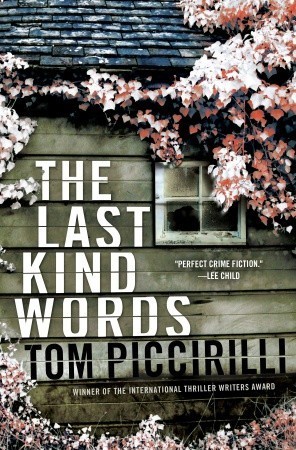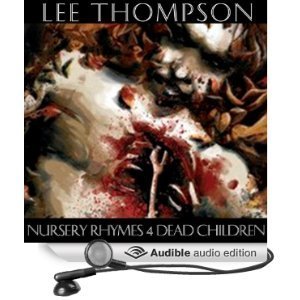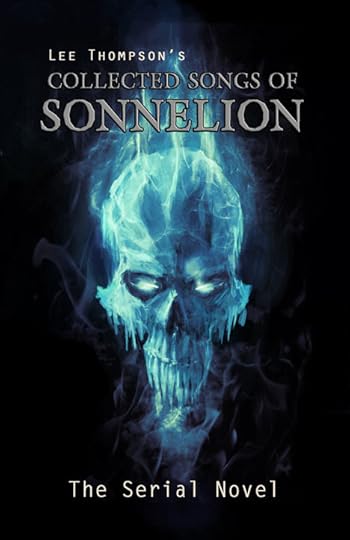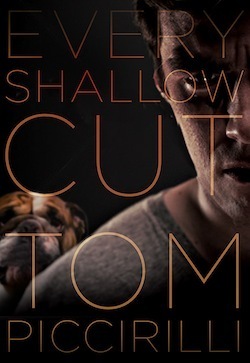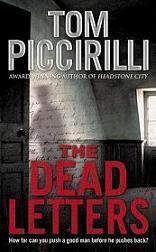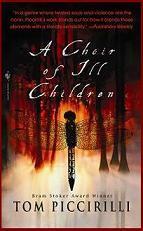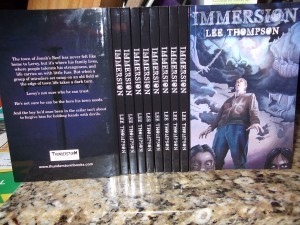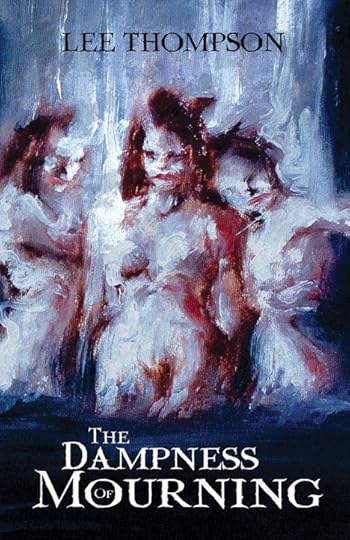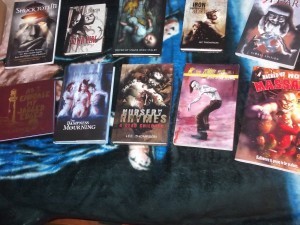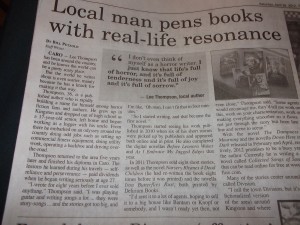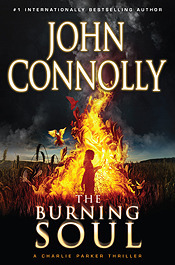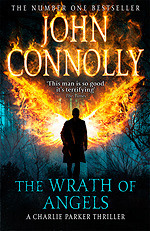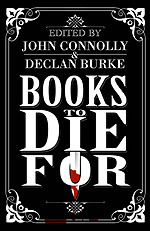Lee Thompson's Blog, page 19
June 11, 2012
The Last Kind Words by Tom Piccirilli
Just picked up Tom Piccirilli’s first Bantam hardcover from Barnes & Noble tonight! Can’t wait to dive into it. Go grab yourself a copy and we can compare notes on his awesomeness post-read!
June 10, 2012
Audio book of Nursery Rhymes 4 Dead Children
Happy to report that the audio version of my first novel NURSERY RHYMES 4 DEAD CHILDREN is now available for purchase. It’s been a real pleasure to work with narrator Matthew Stevens.
Go grab a copy to listen to at Amazon, iTunes, Audibles.
June 8, 2012
Immersion paperback winners!
Thanks to everybody who participated in the Immersion giveaway and help spread the word about my serial novel The Collected Songs of Sonnelion which you can read on Issuu or Darkfuse!
I could ramble on endlessly and make you wait for who the three winners are but you’d just skip to the end (and I wouldn’t blame you), so here we go: I need addresses emailed to me from Mercedes, Chris, and Bec. Congrats to the three of you! And thanks again to everybody who has supported me with your time and cash. To me you all have amazing taste, are snazzy dressers, and I could hug you. Will have another giveaway for The Dampness of Mourning paperbacks in a month or so. It’ll be the same set-up, share about the serial novel because I suck at promotion. May all your dreams come true. Mine surely are and it’d mean nothing without supporters. Thanks!
June 7, 2012
Chapter 16: The Collected Songs of Sonnelion
Up to chapter 16 already! About 12 more chapters to go! Thanks to everybody who has been following along!
If you know anyone who enjoys FREE dark fiction please let them know about the serial. A new chapter is going up every Friday, I’m pouring my soul into it, and it’s going to end up being a very special story. If you have fallen behind you can read all of the chapters on Issuu as well.
In this Division Mythos novel, which is being serialized on Darkfuse’s website, Red Piccirilli has known madness and magic. They’re in his blood and bound to his soul as much as love and loss are. But when his family moves to the town of Division, Pennsylvania, his father grows distant, his mother troubled, and a murderer roams the countryside.
He searches for meaning and truth while battling his own darkness and rage and despair, but corpses whisper answers the dead only share with one another.
June 5, 2012
Tuesday’s Training: Themes
The more I write the more I see what themes are important in my work (and to me) and the easier they are to spot in other’s novels. They’re at the heart of every story that has lasting power.
Why should you worry about themes? They’re what a story is about. They add resonance and depth to what could appear a very simple, straightforward tale whether it’s a tale about Obsession, Madness, Forgiveness, etc.
Why should you explore themes? You get to figure out what really matters to you and to your characters. It’s not always easy, because to know ourselves is demanding, it’s challenging, and sometimes heartbreaking, but it can also be illuminating and refreshing.
Working on this free serial novel, THE COLLECTED SONGS OF SONNELION, I knew right away what some of the themes would be as I brainstormed. That gave me a focus that I wouldn’t have had otherwise, because every scene builds on the last, and every scene means something, even if you don’t find out why until later. I knew that this novel would be about these themes before I sat down to write it:
1. In the opening Red shares that his mom once told him that she was so happy when he was born because she finally had someone who had to love her… and that’s the backbone of the first theme. It’s about desperation, loneliness, the fear of going through life unloved, unappreciated, empty really. And there is another side of the coin because Red thinks it’s a very sad way for his mother to feel at first, but later he may come to understand that longing and that hope once he’s endured some of life’s darker moments. He learns why love is such a driving force, and he learns why some things are worth fighting for and others aren’t.
2. It’s about the power and dangers of friendship. When Red first meets Abraham down by the river in Division he thinks he may have the makings of a new friend in this strange town. He knows that you don’t just find friends, they just sort of happen, and it’s also about acceptance and rejection, and what we’ll let our new friends get away with. When Abraham talks Red into sneaking into the coroner’s basement where a dead girl lays on a table, Red learns that some friendships can also be mysterious and frightening.
3. It’s about trust and how if we give someone too much respect without them earning it then we’ve only burned ourselves. This theme runs through several sections of the novel, as Abraham and his friend Lucas teach Red a horrible lesson when they offer him his first drink and take him back to their apartment behind this strip club.
4. It’s about being a prisoner to our rage and dealing with the consequences of our outbursts instead of controlling our tempers. Letting our hates rule us closes us off, so it’s about that. Letting those things we’re afraid to confront, no matter how horrible they are, or how bad they’ve scarred us, control us and lock us away inside ourselves is also something Red has to overcome after he’s been subjected to Lucas’s lusts.
5. It’s about how unsteady and mysterious life can be. A lot of crazy stuff happens, some of it supernatural, some not (and it’s been happening to Red even before this novel) and even though he seeks answers and grows frustrated, he wants to be a good kid, to love and be loved, to live peacefully and learn to fit in, but he can’t because his destiny is out of his hands, and the choices he makes aren’t always the best ones.
6. It’s about how well (or not) we know our parents. Early on Abraham plants it in Red’s head by asking what he knows about his dad, and Red thinks about it and realizes he hardly knows anything about his father except where he works, a few things he’s done, but most of his dad’s personality is hidden and unknowable to Red. And since a murderer is roaming the countryside since they moved to Division, and his dad isn’t around home much while the local cop spends a lot of time across the street watching the house, Red begins to worry that his dad might be involved with something unthinkable.
7. It’s about sacrifice and how sometimes even if we sacrifice something important to us, it still might not be enough for things to blow over, or for the balance to be restored. Sometimes we can’t give enough to tip the scales. Sometimes things are out of our hands. Sometimes we need someone else’s help. Sometimes we have no idea what to do and that sense of helplessness can be crippling.
8. It’s about sorrow and how we deal with it. The further the novel goes the more sorrow Red has to deal with and so much happens so quickly, and he doesn’t understand why it’s happening, that the situations and the mark they leave on him can only be addressed once that chapter of his life is closed, when he’s forever changed from who he was in the beginning. For better or worse.
9. And as with all my work, it’s about picking ourselves up and carrying on when all that’s left of the face we used to wear lays like a shattered mirror in our lap.
Theme doesn’t (and probably shouldn’t) be a sledgehammer. Nobody wants to be preached at. It’s more than enough to delve into your themes simply by how the characters act and react and how they view the world.
So, Plot is what happens, but Theme is what a story is about. Yet they can work together, and should. If you know your themes before you write your novel you can keep the focus you need to make every scene necessary to the characters growth or decline.
There are literal and figurative themes, as well. Literal being whatever happens is just as it appears, while figurative is an example of an idea like loneliness, friendship,trust, love, hope, despair, grief, forgiveness. And the figurative is demonstrated through the characters actions, musings, dialogue, and core outlook on life, those around them, and themselves. It’s good to have both kinds.
We can also use symbols and motifs throughout our work. Common ones like water and blood standing for life and redemption, or the unstoppable rush of the river that drags us wherever its headed once we’re caught in its current. And we can explore more original symbols and motifs. We can get creative and if we do our job right and the reader is aware they’ll figure some of it out.
The bottom line is this: The sooner you know what you’re writing about the better.
If you haven’t checked out my serial novel go give it a read! If you enjoy it spread the word, if not, screw you.
June 2, 2012
Tom Piccirilli blog tour/interview
Reposting this interview with Pic from earlier this year. We’re getting close to the release of The Last Kind Words! Make sure you snag a copy and see why this guy deserves so much praise.
It’s no secret that Tom Piccirilli is my all-time favorite writer. Why, you may ask, especially if you haven’t read him… Here’s why: his work is beautiful, expertly crafted, memorable, and haunting. It’s stimulating. It’s challenging. It’s entertaining. I could go on. It’s a mystery to me why he isn’t on the bestseller’s list constantly with some of my other favorite writers (like John Connolly and Dennis Lehane.)
I named one of my characters (Red Piccirilli) from my Division series after him. I’ve asked Pic questions over the last few years (and have seen him gladly welcome them from others via Facebook every week) and he’s always kind, always helpful. What’s not to like? Well, if you want a by-the-numbers formulaic story you might not like him, but that’s your loss now isn’t it?
He has an incredible back catalog, from early horror works at Leisure to amazing offbeat dark fiction from Bantam like A CHOIR OF ILL CHILDREN, SHADOW SEASON, THE MIDNIGHT ROAD, THE COLD SPOT, THE COLDEST MILE, etc. And an incredible and huge collection FUTILE EFFORTS, featuring short stories, poetry, and the wicked cornerstone novella FUCKIN’ LIE DOWN ALREADY. Plus fantastic noirellas now available on Kindle: EVERY SHALLOW CUT, THE NOBODY, FRAYED, THRUST, LOSS, THE LAST DEEP BREATH, and ALL YOU DESPISE, among others. And there’s still an iceberg of books buried beneath the water. Tom is one of those writers who have the magic (and the discipline it takes to fine-tune said magic.)
I’m incredibly happy that Pic has agreed to an interview. Enjoy!
Me: Thanks for taking the time to answer questions, Pic!
Tom Piccirilli: My pleasure, Lee, thanks for having me on the blog. As always, I appreciate all your interest. This game is an incredibly difficult one, but having fans like you make it all worthwhile in the end.
Me: My pleasure. Even your crime fiction is beautiful and haunting, where does that stem from?
Tom Piccirilli: From years of honing your craft, finding your narrative voice, and learning how to say what you want to say the way you want to say it. I’ve always felt that it was important to find the innate beauty of the language as I wrote. I never wanted to be a plain writer, but at the same time you always have to be careful not to write as if each sentence is taking a bow, which I was probably guilty of earlier on in my career. That “haunting” aspect is important to make the reader feel something deep for the work. Like a ghost, I want the story to hover and flit in the audience’s mind. I don’t want to just entertain them, I want to move them.
Me: Ever plan to update your wonderful writing book WELCOME TO HELL? Possibly with a crime slant? What have you learned since then and can you share it with us if we give you a lot of money?
Tom Piccirilli: Probably not. The more I learn about writing, the more I realize how little I know about it. What makes it work, what drives the narrative, what people take away from my words. It’s a magical, mystical process. You find a topic, theme, or concept that matters to you, and then you do your best to communicate that to someone else. You draw them through a world of your own perspective and hope that they see and feel things the same way that you do.
Me: You’ve kept your voice (which shouldn’t come as a shock, I guess, since a writer’s voice stems from their soul and perception of themselves and the world around them, right?) What challenges did you face in switching from Horror to Crime fiction?
Tom Piccirilli: Well, a writer’s voice, like the writer himself, is always changing to some degree. We’re living, breathing things and our narrative voice is organic as well. My worldview has shifted, the motifs and themes that interest me are slightly different now at the age of 46 than they were at 25. I care about things now I didn’t understand then. The great fantasy author Jack Cady once told me never to throw any of unfinished fiction out, because somewhere down the line I’d have the skill and control to write about certain things I wasn’t capable of writing about at the time, but I also wouldn’t have the fire and rawness that I had then. And he was right.
As for challenges: Horror and noir writers are always indulging in their darkest, ugliest fantasies. They’re drawn to the awful matters. That’s where they find their drama. That’s where they find their love. They’re tearing into their own scars and making them bleed all over again. And it’s off that blood that we make our art. If it’s art, in the end. But whatever it is, we create it by invoking anguish and conflict and scenes of blood and wreckage. I’ve said it before, but it bears repeating. For me, it feels as if the horror genre is a young man’s game, whereas noir is for older men. When I was young, I was drawn to Horror because Horror is fantasy that focuses on the fear up around the next corner. Whereas now at 46 I’m drawn to crime and noir, because noir is about the fear that’s tailing you, coming up behind you. It’s the embodiment of your disappointments and mistakes and regrets.
Me: Where do you see yourself going next? Or are you happy where you are, with what you’re writing?
Tom Piccirilli: For the time being I’m happy writing noirish dark crime fiction. One of these days I think I’d like to do a bigger novel that has less concentration on the crime stuff and more on other concerns, whatever they are. Family matters, relationships, and all that other shit that is the focus of so much modern literature. I think I’m finally at that point of my life when I see enough humor and darkness and oddity in the so-called “normal” everyday life that I don’t need the storytelling conventions of genre material. The guns, the double-crosses, the heist gone wrong. Maybe one of these days I’ll get around to writing that book, and then again maybe not. Part of the fun of being a writer is not knowing what’s going to suddenly become of interest to you somewhere down the line. You can’t guess at it, you just have to let it persuade you.
Me: I’d love to read that! What have you found most rewarding in your career? What have you found most disappointing?
Tom Piccirilli: The most rewarding aspect is when someone reacts to the work the way I hoped they would. When they’re moved and shocked and come to love the characters the way I do, and the writing has a real meaning for them.
The most disappointing aspects–well, I’m as needy and greedy as the next guy. I’d like to make more cash, I’d like to have greater Hollywood interest, bigger sales, more brouhaha made over my work. I don’t expect lear jets and stadiums full of screaming readers, but hell, I live in my imagination, so I dream big.
Me: You appear a perpetual student of life and the craft. How important has searching for answers been in your growth as a writer and man? Did you study your favorite writers to see what they were doing right and why you loved it?
Tom Piccirilli: You study the things that matter to you, grab your attention, and hold sway over you. I did study my early favorite authors, which generally means that I began to copy the way they did things in a search for my own voice. They spoke to me, and I wanted to do what they did. I wanted to be a part of the overwhelming grandeur of literature. I wanted to impress myself upon it. Your loves shape who you are and how you come at the world, for better or worse. The same holds true for your hatreds, and your frustrations, and your needs. The more self-aware you are the more aware you are of what goes on in other people too. The truth of what drives them. And as such you can convey that through your work.
Me: Is there any story that you’ve wanted to write but haven’t? If so, why?
Tom Piccirilli: I’d love to tackle a huge, sprawling Science Fiction/Fantasy novel, but I just don’t think I have the chops for it. My mind doesn’t work in that way, in those patterns. I love reading it, and I can appreciate all the effort and imagination that goes into such works, and I pine to do something like that eventually, but it’s just not my strength.
Me: In what ways has writing your stories tested you?
Tom Piccirilli: In every way conceivable. The life of a writer tests your sense of self, your knowledge of the world, your understanding of people. It teaches you how to pay bills with late checks, with no checks, how to call back painful incidents in the most excruciating detail. You wallow in your insecurities because this is such a lonely craft. You crave feedback but you’re constantly worried about failing to meet your goals. It’s a constant struggle with self. It’s so easy to be unsure of who you are because all day long you’re slipping in and out of other identities.
Me: I’ve always thought of you as an original and boundary pusher. Do you purposely shy away from the formulaic?
Tom Piccirilli: I try to keep myself as entertained as I hope the reader will be, and since I’m extremely well-read, I get bored easily. I try to find new ways to say things, and find new things to say as well. The authors who’ve meant the most to me over the years, the ones that impacted me the most, are the ones who found offbeat, quirky, sometimes surreal ways to say the great truths of their lives. Whether they were telling stories that focused on life, love, death, fear, redemption, heartache, whatever, they found an original and grabbing way to pull the reader in. I try to do the same.
Me: I’d recommend three of your works for new readers to see your range: A CHOIR OF ILL CHILDREN, THE DEAD LETTERS, and EVERY SHALLOW CUT. Which of your novels would you recommend for new readers to try? Do you have favorites?
Tom Piccirilli: Those three are at the top, so I’d probably recommend them as well. I’m very proud of those particular titles because each one seems to be a slight turning point for me so far as my direction and focus were concerned. My new one THE LAST KIND WORDS is probably my favorite among my crime novels, so I’d promote that one too. I think it’s something of a cornerstone among my books. I pushed myself pretty hard to reach new ground, discuss new topics in new ways, and yet also stay in touch with all the other themes and stylistic elements that I think my readers expect from me at this point.
Me: With THE LAST KIND WORDS coming out next, do you feel you’ve hit a milestone? Can you tell us a little bit about the book?
Tom Piccirilli: It’s the story of a young thief named Terrier Rand who returns to his criminal family on the eve of his brother Collie’s execution. Collie went mad dog for apparently no reason and went on a killing spree murdering eight people. Now, five years later, Collie swears he only killed seven people, and the eighth was the work of someone else. Terry not only has to deal with an ex-best friend, a former flame, some mob guys, and other assorted badasses, but he’s also forced to investigate that night his brother went crazy and find out if Collie is telling the truth. But more than anything, he really wants to know the reason for why his brother went on a spree, in the hopes that Terry himself is never pushed to that kind of edge.
The novel is due out June ‘12, and I recently turned in the follow-up entitled THE LAST WHISPER IN THE DARK.
Me: Can’t wait to read them! Thanks so much for spending time with us, Pic!
Tom Piccirilli: Anytime, man! Thanks for having me!
Tom Piccirilli is the author of more than twenty novels including SHADOW SEASON, THE COLD SPOT, THE COLDEST MILE, and A CHOIR OF ILL CHILDREN. He’s won two International Thriller Awards and four Bram Stoker Awards, as well as having been nominated for the Edgar, the World Fantasy Award, the Macavity, and Le Grand Prix de l’Imaginaire.
Feel free to leave a comment and spread the word! Thanks!
June 1, 2012
Immersion pics
Received my author copies of Immersion and will be mailing them out to my readers tomorrow morning. If you haven’t entered the giveaway for 3 paperbacks then you need to hop to it because the giveaway will end next weekend. Thanks to those who have already participated and spread the word about the serial novel! Have a great weekend!
May 29, 2012
New Paperback released
“A Riveting Thriller.” — Midwest Book Review
I have to agree with the Midwest Book Review. And I’m happy to announce that one of my Division novels (the one above) is now available in trade paperback. Great. Go snag a copy and let me know what you think.
May 28, 2012
Tuesday’s Training: Should you self-publish or go traditional?
That’s not a question I can answer for you since I can only answer for myself, based off what I want as a writer, based on my drives, expectations and experience. I see this topic come up a lot and usually don’t pay much attention because all the hating publishers who don’t deserve it is childish and it gets old. Not that there aren’t bad publishers out there, with self-publishing there are more presses(?) popping up than ever before. I know you’ll want to figure out which direction is the right one for you, or perhaps a little of both.
Here’s what helped make up my mind to go with Delirium Books instead of trying to be a self-publishing superstar (good luck with that if it’s your dream!)
1. I have a professional editor’s opinion, and I know the little bigot in us says that a professional opinion doesn’t matter (until we label ourselves professionals, then our opinion better matter! Please.) It’s important for me to have someone tell me when I’m coasting by, which I can do sometimes. I want that push to make something better than I’d do on my own. It’s why part of my writing time is caught up in trying to impress my first readers.
2. I get money up front for hardcover editions, money up front for paperback editions, plus I get royalties.
3. I get more royalties from ebooks, too. And I know my publisher pays me a great royalty because I did my research. I would actually make less per copy if I self-published them because I’d be dumping my money from a regular job into cover design, layout, marketing, copy editing, etc. I’d rather make the more royalties from my publisher handling all that other crap instead of it coming out of my pocket and out of my time.
4. I get original book covers that I don’t have to pay a dime for (because my publisher pays for it.)
5. I get a copy editor with sharp eyes who picks up things me and my first readers and everybody else involved missed (because my publisher pays for the copy-editing, too.)
6. I get author copies of hardcovers and paperbacks that I can give to my first readers because I appreciate how much they always, always help me.
7. I get physical books I can take to conventions and book fairs, and with those physical books can do readings and signings and sell them in person.
8. I get to fill up my bookshelf with my work (or my bed, it happens.) Here’s what’s been published in the last year or so.
9. I get a marketing director (Dave Thomas, not of Wendy’s fame) who does a fabulous job.
10. I get to have physical copies for interviews with the local papers and surrounding areas.
And that’s why I went with Delirium Books instead of self-publishing. I don’t have the mind for the self-publishing route, I’d rather be creating and reading. Getting to the point where I was good enough to sell my work wasn’t easy (I’ve been stupid most of my life) but it’s paying off, and I know it’s the right thing for me. Go think about what’s right for you. Weigh the pros and cons, not just the idea of freedom. Freedom doesn’t exist. You’re bound in an unspoken contract with every reader who picks up your book and you want to give them the best product you can, right? Go on, get out of here (but tell your writing friends to check out my Writing Advice essays, and come back yourself.)
Also check out, and if you enjoy it, spread the word about my free serial novel THE COLLECTED SONGS OF SONNELION.
Later, taters.
A few questions with author John Connolly
NY Times Best-selling author John Connolly was kind and generous enough to answer a few quick questions for us. A huge thanks to John for that as well as a huge thanks to Clair Lamb for arranging it. John is one of my biggest influences so this means the world to me. His work is always emotional, insightful, entertaining, and razor-sharp.
THE BURNING SOUL is out in paperback on June 21 in the UK and June 26 in the US.
THE WRATH OF ANGELS will be out on August 30 in the UK, and we’re waiting on a final date in the US.
John is also co-editor, with Declan Burke, of an anthology called BOOKS TO DIE FOR, coming on August 30 in the UK and on October 2 in the US. There’ll be a signing event for BOOKS TO DIE FOR at Bouchercon.
Me: Thanks so much for taking the time to answer a few questions, John! Who were your biggest writing influences?
John: In the genre, probably Ross Macdonald and James Lee Burke: Macdonald for his compassion, and Burke for the sheer quality of his prose, and the way in which he describes the natural world. I doubt that I’d be writing what I do had I not read those two. Mind you, Ed McBain’s Let’s Hear It for the Deaf Man was the first mystery novel I ever read, I think, so I owe the late McBain too. But most of my reading is outside the genre, and more and more so as I get older. I think Bleak House by Charles Dickens is the greatest novel in the English language, although interestingly Sara Paretsky chose to discuss it as a mystery novel for an anthology that I’m co-editing later this year, so I guess it’s all in the eye of the beholder.
Me: Excellent. I’ve yet to read Bleak House so will move that to the top of my TBR pile. Whose writing do you enjoy most out of your current peers?
John: That’s a bullet I’ll have to dodge, as there are just too many of them to mention, and I risk leaving someone out. I do think that the growth in Irish mystery writing in recent years has been remarkable, and there is such an array of tone and style among the writers who have emerged. Declan Burke’s blog is a good starting point if people want to find out more about Irish mystery writing.
Me: Thank you. What was the impetus for creating Charlie Parker?
John: I’m not sure that I thought in those terms when I began writing the books. The first piece of fiction that I wrote – almost eight years after I left school – was the prologue to Every Dead Thing, so he pretty much arrived with his baggage in tow. Like most writers, I simply wanted to write, and mystery fiction seemed like the form that would best allow me to explore the subjects and themes that interested me. But I suppose Parker now is not Parker as he was, just as I’m not the same writer who created him, as nearly two decades have passed since I began writing that first book. He’s more complex and nuanced, I hope. Then again, people still come up to me and say that Every Dead Thing is their favorite of my mystery books, which possibly suggests that it’s all been downhill ever since…
Me: Lol. You have definitely not gone down hill ever since. Thanks so much for your time, John. And thanks again to Clair. Can’t wait to read the new novels coming out later this year!
Happy Memorial Day to everybody! If you haven’t read any of John Connolly’s work I strongly urge you to give it a try, whether you pick up the Charlie Parker series, The Book of Lost Things, his collection Nocturnes, or the YA books featuring Samuel Johnson. Find out more at John’s website.

